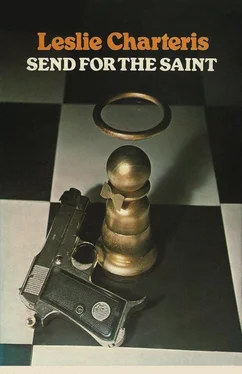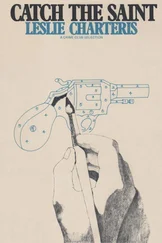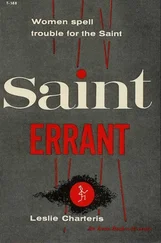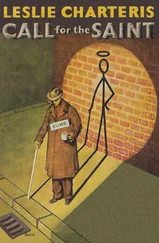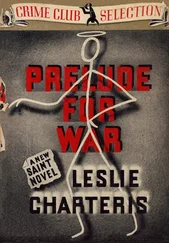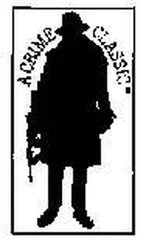He patted his breast pocket meaningly, and the girl’s eyes widened.
“You helped yourself?”
“Shamelessly,” replied the Saint. “To forty thousand pounds in conveniently large-denomination Swiss franc notes.”
“Forty thousand! But... you said your fee was to be twenty thousand!”
Simon Templar looked aggrieved.
“But I was commissioned for that sum twice,” he pointed out. “Twenty thousand from Patroclos One, twenty thousand from Patroclos Two. Wasn’t it lucky that they turned out to share a safe?”
And he smiled his incorrigible mocking smile.
“Come on — let’s go and get that lunch,” said the Saint.
On a certain grey afternoon in November of that year — traditionally a month when depression and despair sink to the nadir — a short balding man with an exclusive legal right to the name of Albert Nobbins was walking dejectedly by the Serpentine in London’s Hyde Park.
There was rain in the air, and no one else was visible in the park except a few dutiful dog-walkers dotted about way over beyond the far side of the lake. Nobbins walked with an aimless and plodding gait, faltering frequently like a man with scarcely more incentive to move forward than to go back, or to stand still. His purposeless steps took him along the lakeside path because that was the way he always went; and he was walking there in the park, not because he had anywhere in particular to go, nor even with the object of exercising his small flabby body, but because it was his habit, and because there was nothing else he could think of to do.
He neither saw nor heard the black car that slowed to a crawl on the road some fifty yards obliquely behind him. But even if he had seen or heard it, he was too deeply sunk in melancholy thought to pay it any special attention, and too far away from it to see the heavy revolver which the man in the back seat was toying with, almost affectionately...
Some men are Winners, gifted with every advantage in the scramble of life that nature and nurture with their most munificent combined efforts can supply. The Winner is that rare man who seems to lead a charmed life right from the beginning. As an infant, he never knows what it is to be short of a lollipop. His schoolboy marbles invariably conquer and multiply, and he attacks a ball with various conventional implements with seemingly innate dexterity. Later, his girlfriends are abundantly plural and pulchritudinous; he reaps sporting or academic honours, or both, by the dozen; and plum jobs drop into his lap even when he hasn’t exerted himself beyond the effort of sitting under the tree.
Success, recognition, popularity, money, affection: all through his life the Winner seems to attract them with nonchalant ease. He enjoys a distinguished and rewarding career, leading a blamelessly honourable existence and in due season breeding tribes of children and grandchildren — themselves doubtless including a goodly proportion of Winners.
Now to someone whose outlook as a respectable dutiful citizen has been perverted by exposure to some heretical scepticism about the Establishment, this picture of fulfilled felicity will undeniably seem tinged with dullness around at least some of its edges. Albert Nobbins, however, as he plodded along by the Serpentine on that damp grey November day, could contemplate it only with envy.
Nobbins was a Loser — an insignificant little man whose failures seemed to him as congenital as a Winner’s successes. As if it were not enough to have inherited such a risible cognomen as Nobbins, his parents had compounded his misfortune by linking it with one of the most unglamorous of Christian names. And from that depressing start, his fortune was apparently foredoomed. Lollipops, marbles, girls, success in sport or studies or career, were all one to Albert Nobbins: they had all evaded him as if by some inexorable magnetic repulsion. And despite his most desperate endeavours, his attempts to wield a bat or club or racquet had infallibly wobbled themselves into a shape so ineffectually awkward, so far removed from any semblance of style, that onlookers were invariably reduced to helpless howls of laughter.
He could hear that cruel laughter still, more than forty years on.
He stopped and stared glumly at the water: half a dozen ducks scudded hopefully towards him and converged on a spot a few yards from the bank, the distance which they knew from experience to be the average crust-tossing range of the general public. But Albert Nobbins shook his head at them abstractedly, and they dispersed as he plodded on with the same short, somehow inefficient steps. An insignificant little man, plump and balding and bespectacled, who every morning shaved his face to the same pink well-scrubbed shininess.
He had always been acutely resentful of his puny physique. He knew it was one of the roots of his lack of confidence, and he knew that his lack of confidence in turn explained his lifelong failures. He had no presence. Nobody noticed him; and the ultimate result of that was that whatever potentialities he might have had to be positive, assertive — effective — had been stunted. But buried within him was a smouldering core of angry rebellion; buried less deeply now than at any time in his life, but still unsuspected by nearly everyone who knew him. He had ability and diligence — enough to have served his country in positions of modest responsibility and trust (as he might have put it himself) but he was bitterly conscious of how much he might have done but hadn’t, of how much of him was unfulfilled.
A few spots of heavier rain splattered down. Nobbins turned up the collar of his fawn gabardine raincoat and walked on. He lived near by in a small bachelor flat in Knightsbridge, and had made a habit of walking in the park for an hour or so whenever he had an afternoon free. If it rained, he got wet: a trivial matter to a confirmed Loser, a man born — and a sardonic smile flickered briefly on his lips as the phrase occurred to him — born with a cardboard spoon in his mouth. And what was a spot of rain to a man who had just lived out six weeks in the shadow of The Squad? He had been through nobody-knew-what agonies of fear — always conscious that he might be exposed at any moment, never knowing when sentence would be passed on him, when the blow would fall, the final deadly shots ring out... He was like a man too afraid of heights even to ride upstairs in a double-decker bus, but who had walked the circus high wire, and had somehow, miraculously, survived. But it was on a note of failure that he had left The Squad behind him. He had been replaced. And now he felt slack and washed out. Failure again. Always the same story.
He walked on, his thoughts a bitter recapitulation spanning his whole life: and he cursed again the malignity of the fates which had condemned him to imprisonment in that small ineffectual body.
The black car was still moving near-silently at a slow walking pace, keeping the same relative position behind Nobbins and to the side of him. The driver, a raw-boned hard-faced Scot, put down the binoculars for which he had momentarily taken his eyes off the road.
“Aye, that’s him right enough.” He glanced backwards at the handsome tough-looking man behind him, a man with a shock of dark hair, longer side-whiskers than the general fashion, and a bandit’s moustache. “All right, Gascott. You know what to do.”
Gascott’s lips curled back briefly in a cursory smile which somehow combined anticipatory relish with a cold contempt for the two men in front, and he nodded once.
“Yes, Lembick. I know what to do. Bang bang bang.”
And Gascott laughed, a cold metallic laugh.
“Get on with it then!” Lembick snapped, his gorge rising quickly, as always with this cockily competent New Boy. Lembick fiercely resented Gascott’s superior assurance; and so did Cawber, the square and equally taciturn passenger beside him who was now nursing a cumbersome cine camera.
Читать дальше
